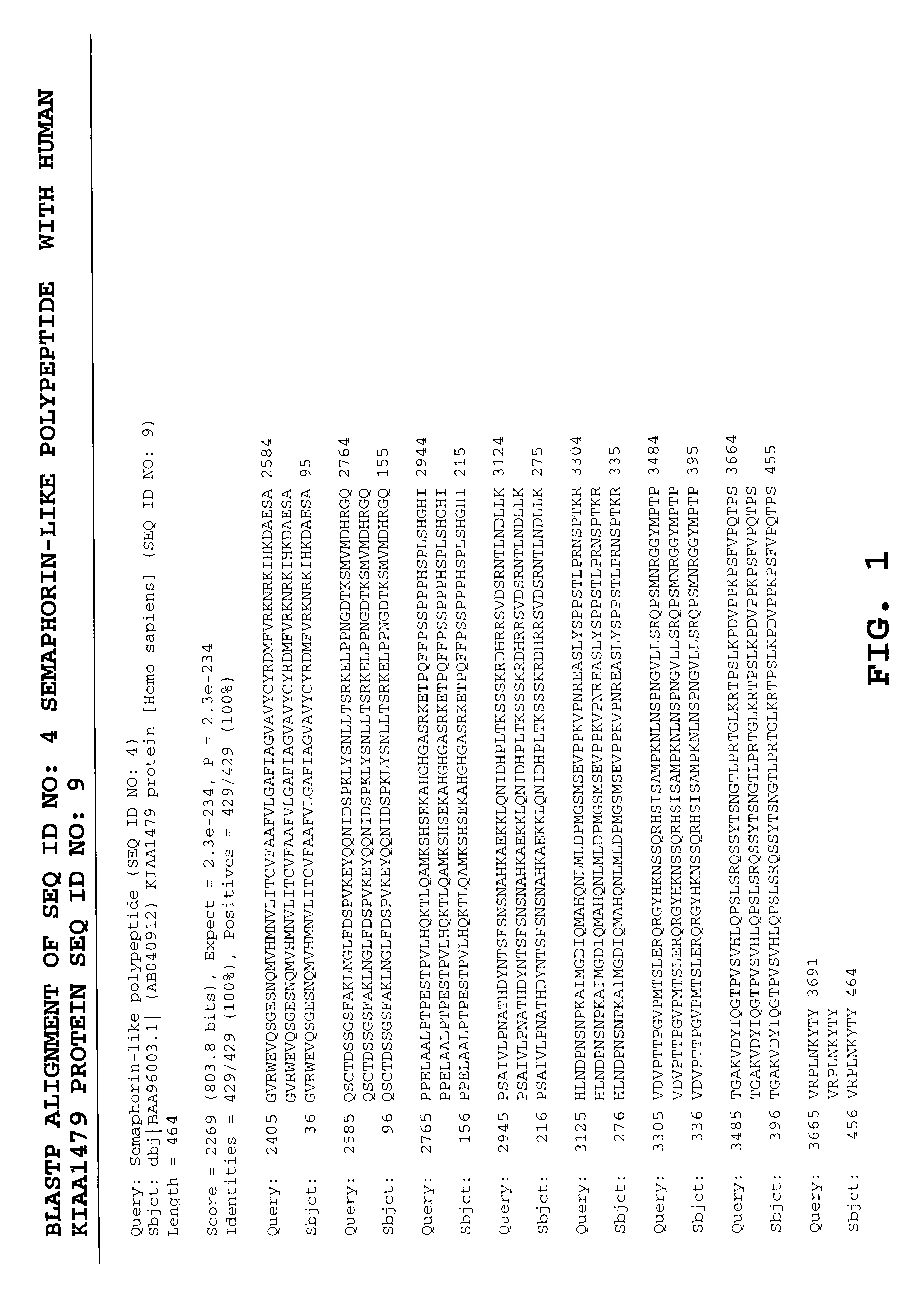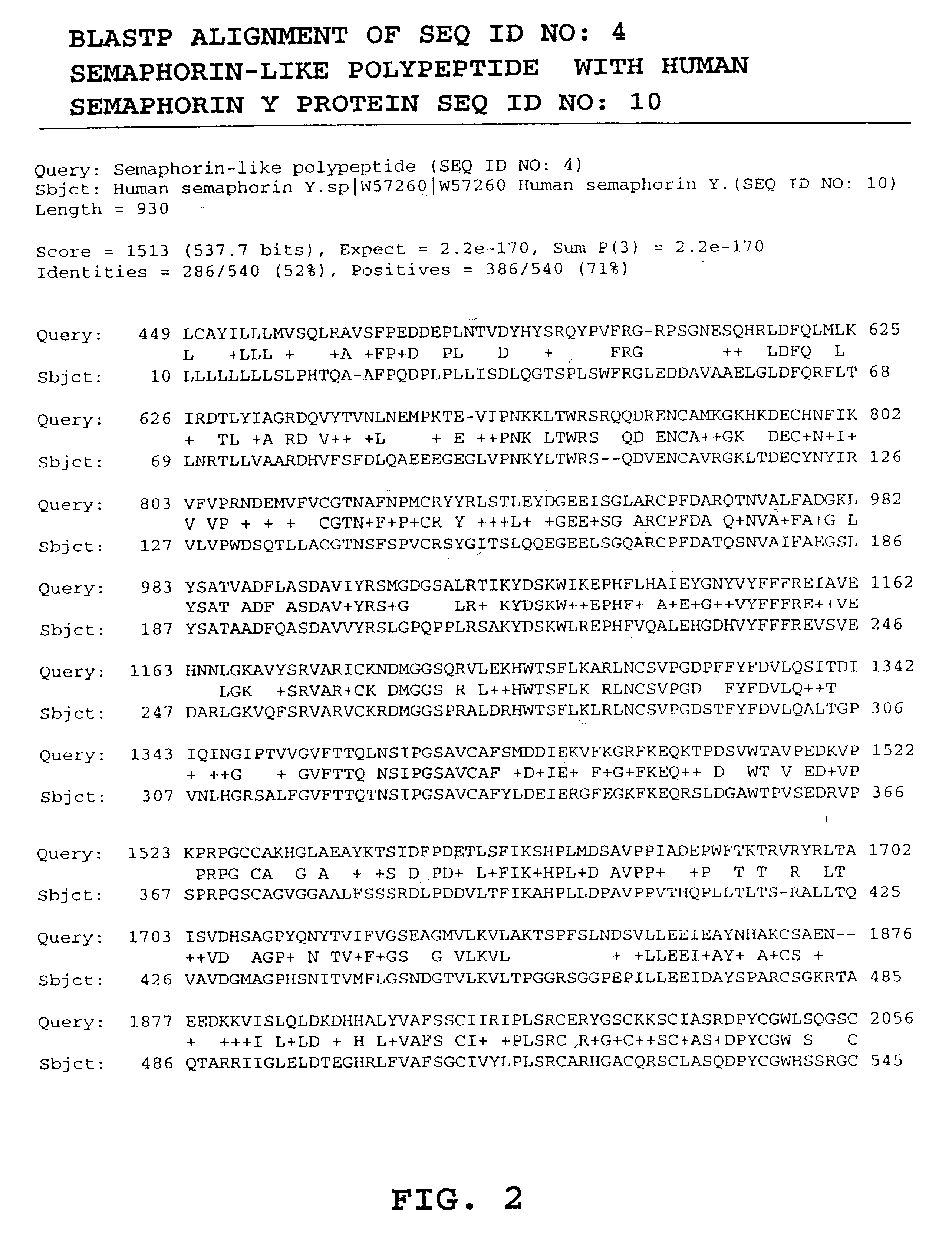Antibodies specific for semaphorin-like polypeptides
a polypeptide and anti-semaphorin technology, applied in the field of new semaphorinlike polypeptides, to achieve the effect of reducing the side effects of such an agen
- Summary
- Abstract
- Description
- Claims
- Application Information
AI Technical Summary
Benefits of technology
Problems solved by technology
Method used
Image
Examples
example 1
Isolation of SEQ ID NO: 1 From a cDNA Library of Fetal Liver-spleen
A plurality of novel nucleic acids were obtained from a cDNA library prepared from fetal liver-spleen (Hyseq clone identification numbers 5688868 (SEQ ID NO: 1)) using standard PCR, sequencing by hybridization sequence signature analysis, and Sanger sequencing techniques. The inserts of the library were amplified with PCR using primers specific for vector sequences flanking the inserts. These samples were spotted onto nylon membranes and interrogated with oligonucleotide probes to give sequence signatures. The clones were clustered into groups of similar or identical sequences, and single representative clones were selected from each group for gel sequencing. The 5' sequence of the amplified inserts was then deduced using the reverse M 13 sequencing primer in a typical Sanger sequencing protocol. PCR products were purified and subjected to fluorescent dye terminator cycle sequencing. Single-pass gel sequencing was do...
example 2
Assemblage of SEQ ID NO: 2
The nucleic acid of the present invention, designated as SEQ ID NO: 2 was assembled using SEQ ID NO: 1 as a seed. Then a recursive algorithm was used to extend the seed into an extended assemblage, by pulling additional sequences from different databases (i.e., Hyseq's database containing EST sequences, dbEST version 114, gb pri 114, and UniGene version 101) that belong to this assemblage. The algorithm terminated when there was no additional sequences from the above databases that would extend the assemblage. Inclusion of component sequences into the assemblage was based on a BLASTN hit to the extending assemblage with BLAST score greater than 300 and percent identity greater than 95%.
The nearest neighbor result for the assembled contigs were obtained by a FASTA version 3 search against Genpept release 114, using FASTXY algorithm. FASTXY is an improved version of FASTA alignment which allows in-codon frame shifts. The nearest neighbor result showed the clo...
example 3
Assemblage of SEQ ID NOs: 3 and 4
Assembly of novel nucleotide sequence of SEQ ID NO: 3 was accomplished by using an EST sequence SEQ ID NO: 1 as a seed. The seed was extended by gel sequencing (377 Applied Biosystems (ABI) sequencer) using primers to extend the 3' end (primer extension). The 5' end was extended using RACE, as disclosed in Marathon-Ready.TM. cDNA User Manual (PT1156-1) (Clontech) herein incorporated by reference.
A polypeptide (SEQ ID NO:4) was predicted to be encoded by SEQ ID NO:3 as set forth below. The polypeptide was predicted using a software program called BLASTX which selects a polypeptide based on a comparison of translated novel polynucleotides to known polypeptides. The initial methionine starts at position 434 of SEQ ID NO:3 and the putative stop codon, TAG, begins at position 3692 of the nucleotide sequence.
FIG. 1 shows the BLASTX amino acid sequence alignment between the protein encoded by SEQ ID NO: 3 (i.e. SEQ ID NO: 4) and the human KIAA1479 protein (...
PUM
 Login to View More
Login to View More Abstract
Description
Claims
Application Information
 Login to View More
Login to View More - R&D
- Intellectual Property
- Life Sciences
- Materials
- Tech Scout
- Unparalleled Data Quality
- Higher Quality Content
- 60% Fewer Hallucinations
Browse by: Latest US Patents, China's latest patents, Technical Efficacy Thesaurus, Application Domain, Technology Topic, Popular Technical Reports.
© 2025 PatSnap. All rights reserved.Legal|Privacy policy|Modern Slavery Act Transparency Statement|Sitemap|About US| Contact US: help@patsnap.com


